

And yet how can any village charm without villagers? Pre-war German tin figures (Zinnfiguren) match the scale of the houses -- the people can actually fit through the doors! -- and fairly beg someone to tell their tales. That's what I've been doing for a few years now in my continuing Christmas tale. So please, take a stroll through the village as it pays homage this year to:
The Winter Olympics!
No parade, no toy trains ... it was all very disappointing. But then, just when the children were convinced that nothing good would ever happen in their little village again, the mayor saved the day. Using all of his influence, and with funding supplied by his still-wealthy wife, the mayor was able to organize a winter competition in skiing and skating, the first of its kind in the region.
And so it is that the mayor and a couple of prominent businessmen have paused outside the new hospital, waiting for Banker Max Schurster and Doctor Nicholas Greene to join them for yet another Very Important Meeting in the top-floor offices. The news the mayor will present is all good: more athletes than anyone expected have entered the competition, and many of them are Europeans, which will lend immeasurable prestige to the mayor's Winter Olympics plan. Plus, the snowfall has been perfect for the alpine skiing events, so much so that they have run out of places to put the stuff. The pile near the athletes' rink is over everyone's heads, and when was the last time anyone saw that?
Smaller, shyer, and yet somehow more graceful than many of the other athletes, Sonja will skate in this, her first competition ever. It's a miracle! Although she did not have enough money to pay the modest entry fee, someone came forward anonymously to pay it for her. Sonya is convinced that the someone is the husband of her employer, Mrs. Pettifore. Attorney Pettifore has shown an unusually keen interest in Sonya's skills on ice. She dare not thank him, but she wishes she could.
At the other end of the ice, a happier couple stand with their heads together, watching their little one in her first visit to Santa Claus. Santa is at City Hall this year -- the mayor's idea -- and Santa has gifts and candy, also the mayor's idea. (Christmas really is a magical time for him, despite his driving ambition. He remembers his own childhood with neither Santa nor gifts all too well.) Harmony Jenkins is holding her breath: little Felicity may or may not burst into tears when finally she gets to sit on Santa's lap. The child is incredibly strong willed, and the child is determined to talk to Santa without having her parents listen in. Will is delighted. He wants his daughter to stand on her own two feet in life, and when she isn't running as fast as she can, that's what Felicity is doing. Will shifts his son from one arm over to the other; the lad is heavily built, and Will is glad. Harmony likes to remind her husband that "The apple didn't fall far from the tree." Which is why broad-shouldered Will is the one holding their son while they wait, and not Harmony.
Old Man MacGowan is there, pulling on his pipe, watching the skating from the porch of a friend. He hasn't been the lighthouse keeper for a while now, but he hasn't quite adapted to living ashore, either. His first rooms didn't suit, and now he and the cat are staying with a pal while he looks for another place to rent. But what with the winter games and all, a room is just about impossible to find. And his pal -- some pal -- has told him he'll have to share his room with a Dutchman who's arrived late for the competition! That's his complaint to Mrs. Jack Jones, but she hardly hears him. She is still grieving, nine months later, over the loss of Rusty, the best, the sweetest, the most loyal, the dearest, the most loving dog in the world. Her husband wants her to get another, but Mrs. Jones isn't ready. Not yet. If she will ever be. How could she be? So ... no. Not for now.
Doctor Green is talking with the woman he knows he wants to spend the rest of his life with, but right now is not the best time to mention that. Midwife Grace Newcomb is concerned: one of her patients is overdue and very unwell. Would the doctor please stop in with her to check the patient over? "Of course, Grace," he says at once. The meeting of the Winter Games Committee will have to go on without him.
In the meantime the competition, like all successful events, has caused a traffic nightmare. The mayor's wife, passing by the villagers' rink, is beside herself with impatience. How in heaven's name has her driver managed to get himself caught behind old John Hooks and his plow-horse sleigh ride? Granted, the sleigh ride has become a popular event and has made old Hooks a little more solvent, at least in the winter season when the farm is quiet. But really! Should he be allowed to poke along on the narrow route when there are people with more important things to do than listen to a bunch of screaming children? Children! They are so ... childish. Lavinia had only the two, both carried away by influenza, and to see all those children squealing with laughter -- well, it's painful, that's all, and she would rather not be forced to listen.
Jimmy, bent low from his brother's weight on his shoulders, doesn't even bother turning around. "Who sez? Sez you, Billy? Go roll in the snow and stop botherin' us."
But Billy, for once, is not intimidated. He's too fond of Mrs. Soames. "I said, get away from there, or I'm tellin'."
Oh. Fearing for his life now, Billy answers, "I didn't know."
Jimmy rolls his eyes. "No, you wouldn't. Let's go," he tells his brother. They begin to leave, and then Jeffrey turns back to Billy and says, "You comin' or not?"
"Who, me?"
"Who do you think? The Santa statue? Yeah, you."
"Um, sure, I'll come. To -- where we going?" Suddenly a dark alley seemed the most likely choice.
"To check out the skiers, what d'ya think?"
"Oh! Well, that's what I figured, o' course," Billy answers, amazed at this turn of events. Him, with Jimmy and Jeffrey! It doesn't seem possible! He's been invited to do something and doesn't even have his cousin Mickey Sullivan around to force it to happen. It's just happening! This is the best day of his life so far!
"What're those?" Jimmy and Jeffrey murmur to one another. "And what's a slalom?" asks Billy. These are questions that burn in young boys' minds. But for the most part they are silent, watching with awe as the superb athletes race with breathtaking speed and complete fearlessness down slopes that may not be on a par with the Alps, but which look plenty steep and breakneck to the boys.
Billy pulls up short in front of his house, aware that his idyllic afternoon is winding down. And aware, suddenly, that he has neglected to tell his mother where he was going. "Oh gosh, my mom's gonna -- well, anyway, thanks. And ... and Merry Christmas, fellas. And thanks."
"Yeah, same to you," says Jeffrey, and the two brothers continue their trudge through new falling snow, heading for home.
The 2013 Christmas mantel. For closeups, click on the Church and each of the thirteen
houses.

For a widescreen version of this mantel village, click here.
The Skater Athletes' Rink (Houses, 1, 2 and 3):
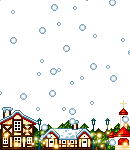 The village has been under stress of late. It seems that for every good thing that happens, a terrible thing happens to cancel it out. The marching-band parade was so much fun a couple of years ago, but then Mrs. Lavinia Pittman, the mayor's philanthropist wife who paid for it, put her foot down and said, "Too much money. No more." And that was that. The children were so sad. And last year the village lost one of its most beloved denizens, Papa Ted; there would be no more of his toy train displays, no more saxophone performances, that so delighted the children. Of course, the village now has a wonderful hospital, thanks again to Mrs. Pittman -- but that isn't exactly something the children look forward to seeing. Needles! Who likes needles?
The village has been under stress of late. It seems that for every good thing that happens, a terrible thing happens to cancel it out. The marching-band parade was so much fun a couple of years ago, but then Mrs. Lavinia Pittman, the mayor's philanthropist wife who paid for it, put her foot down and said, "Too much money. No more." And that was that. The children were so sad. And last year the village lost one of its most beloved denizens, Papa Ted; there would be no more of his toy train displays, no more saxophone performances, that so delighted the children. Of course, the village now has a wonderful hospital, thanks again to Mrs. Pittman -- but that isn't exactly something the children look forward to seeing. Needles! Who likes needles?
 Mayor Albert Pittman is a visionary. Not this year, but some year, he is convinced that there will be a Winter Olympics that will rival the prestigious Summer Olympics in scale and grandeur. (After all, weren't the winter Nordic Games in Sweden already a grand success?) When a Winter Olympics finally does become a reality, the mayor would like the powers that be to consider his village a top candidate to host the event. Why not? The skiing is excellent, the ice predictable (usually), and they now have a first-class medical facility for such a small village. The villagers themselves will bend over backwards to support an event that promises to bring commerce and prosperity. Why, a couple of men in the village are such outstanding athletes that you could say they were future Olympians themselves.
Mayor Albert Pittman is a visionary. Not this year, but some year, he is convinced that there will be a Winter Olympics that will rival the prestigious Summer Olympics in scale and grandeur. (After all, weren't the winter Nordic Games in Sweden already a grand success?) When a Winter Olympics finally does become a reality, the mayor would like the powers that be to consider his village a top candidate to host the event. Why not? The skiing is excellent, the ice predictable (usually), and they now have a first-class medical facility for such a small village. The villagers themselves will bend over backwards to support an event that promises to bring commerce and prosperity. Why, a couple of men in the village are such outstanding athletes that you could say they were future Olympians themselves.
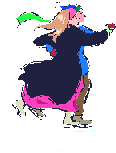
 Of course, deep snow means available ice is at a premium, and the townspeople have not been allowed to skate on the rink that has been set aside strictly for the competitors in the figure skating events. The rink is buzzing right now with a variety of skilled skaters: pairs and men's singles and of course women's singles. Several of the singles skaters, in a lighthearted moment, have even linked arms in a stab at ice dancing, which they are certain will someday be a recognized sport. Behind the iron fence, a cluster of fans study the practicing athletes with keen interest. The young boy would like to compete himself one day; his sister, on the other hand, would love to meet one of the Eisenberg twins (either one would do).
Of course, deep snow means available ice is at a premium, and the townspeople have not been allowed to skate on the rink that has been set aside strictly for the competitors in the figure skating events. The rink is buzzing right now with a variety of skilled skaters: pairs and men's singles and of course women's singles. Several of the singles skaters, in a lighthearted moment, have even linked arms in a stab at ice dancing, which they are certain will someday be a recognized sport. Behind the iron fence, a cluster of fans study the practicing athletes with keen interest. The young boy would like to compete himself one day; his sister, on the other hand, would love to meet one of the Eisenberg twins (either one would do).
 But Sonya is wrong. It's Johnny Hooks who has come up with the fee; Johnny Hooks who from the sidelines watches her practice. She is so perfect in every way, he believes. How can she not skate away with a medal? His mood is melancholy, his smile bemused as he admires this love of his youth, this girl he once brushed aside to go to sea and for whom now he has such tender regard. Sonya! If only he had done things differently.
But Sonya is wrong. It's Johnny Hooks who has come up with the fee; Johnny Hooks who from the sidelines watches her practice. She is so perfect in every way, he believes. How can she not skate away with a medal? His mood is melancholy, his smile bemused as he admires this love of his youth, this girl he once brushed aside to go to sea and for whom now he has such tender regard. Sonya! If only he had done things differently.
The Villagers' Skating Rink (Houses 4, 5, 6 and the Church):
To soothe the villagers' rumpled feelings over being excluded from their usual skating rink, the Winter Sports committee has come up with the funding (from Lavinia Pittman, who else?) to install a second rink in front of Father Andrew's church. The aging priest doesn't mind at all. He enjoys the merriment, and besides, it's good for walk-in business. Mrs. Pettifore pauses to ask whether there is anything that he still needs for the parish pot-luck the following day, and Father Andrew has to think. "I did make a note somewhere," he tells her, and then: "Ah! I remember. We're light on teaspoons." "Done," said Mrs. Pettifore. Being an enthusiastic shopper, she has many sets of cutlery in her very large home, and everyone knows to go to her for village events that are short of supplies.
As for the rink itself, it's much more populated and not quite as groomed as the competitors' rink. Gouges in the ice, refrozen lumps and just too many skaters make for a lot of falling down, most of it in fun. Who can get angry on ice? And besides, Father Andrew has had his organist play the liveliest carols she knows; their notes echo through the church and spill out over the skaters, giving many would-be singles and pairs Olympians something to (try to) dance to. All in all, the temporary rink is working out well. It will be even better when Sam Rickens gets done sweeping away the ice shavings.
 Clyde and Margaret have decided to show the other townspeople how it's done. Their skating is precise, formal, and fall-free, because they have taken lessons from the best. Which is as you would expect, because Clyde and Margaret are the luckiest couple in town. Money seems to fall into their laps (the villagers all say), and they spend it as fast as they know how, because there's so much of it that they don't think they'll ever be able to get through it. Clyde and Margaret are a wonder.
Clyde and Margaret have decided to show the other townspeople how it's done. Their skating is precise, formal, and fall-free, because they have taken lessons from the best. Which is as you would expect, because Clyde and Margaret are the luckiest couple in town. Money seems to fall into their laps (the villagers all say), and they spend it as fast as they know how, because there's so much of it that they don't think they'll ever be able to get through it. Clyde and Margaret are a wonder.
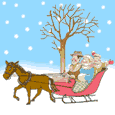 Trailing behind the mayor's wife (some would say, dogging her heels) is the ever-merry Dorothea Sparks. She can hear the children as well, and what she hears delights her. She loves the sound, the sights, of pleasure being had. It's what life should be about, after all: joy and fun and all things happy. Which isn't to say that Dorothea has not had her trials. But somehow she's managed to emerge stronger for them -- especially the loss of her first husband in a carriage accident, because she really did love him -- and she has learned to take each day as it comes and savor it. It's just too bad that Lavinia doesn't see life that way. If only they could be friends! Dorothea has much that she could teach the aloof Lavinia Pittman.
Trailing behind the mayor's wife (some would say, dogging her heels) is the ever-merry Dorothea Sparks. She can hear the children as well, and what she hears delights her. She loves the sound, the sights, of pleasure being had. It's what life should be about, after all: joy and fun and all things happy. Which isn't to say that Dorothea has not had her trials. But somehow she's managed to emerge stronger for them -- especially the loss of her first husband in a carriage accident, because she really did love him -- and she has learned to take each day as it comes and savor it. It's just too bad that Lavinia doesn't see life that way. If only they could be friends! Dorothea has much that she could teach the aloof Lavinia Pittman.
The Village Streets (Houses 8, 9, 10, 11 and 12):
Close by the downtown center are the crowded streets of the village, with small houses set cheek by jowl. In the largest of them, Banker Max Schurster has just concluded a visit to Alice Whipoole, the widow of his cousin Edward. Alice has been overdue with her house payments, and the banker has made allowances for her because she's kin. But it doesn't look good for Alice; her time in the house is nearly up. It pains the banker to have to tell her that. And yet what can he do? She has no means. And her husband, the banker's cousin or no, was always a fool with money. This isn't the first time that Max Schurster has had to foreclose, but somehow he's not able to harden himself the way he is used to doing. "I'm sorry, Alice," he says, and for once he means it. Tell that to Alice's dog Spotty, though: the animal senses Alice's distress and begins barking loudly. And Max, realizing that a mere dog is more protective of his mistress than he himself is of his deceased cousin's wife, walks away thinking, "There is something more can be done here ...."
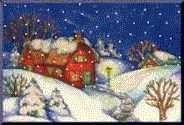 Big Billy finds himself a witness to a crime! Well, not a crime yet, exactly. He's not sure what Jimmy and Jeffrey are up to, but it looks to him as if they're trying to break into the house of Mildred Soames. "That's terrible!" Billy mutters to himself, and, gathering his courage, he ascends the steps of their retired teacher's home. "Hey, you shouldn't be doing that," he says in a high, quavering voice. "You come away from that window."
Big Billy finds himself a witness to a crime! Well, not a crime yet, exactly. He's not sure what Jimmy and Jeffrey are up to, but it looks to him as if they're trying to break into the house of Mildred Soames. "That's terrible!" Billy mutters to himself, and, gathering his courage, he ascends the steps of their retired teacher's home. "Hey, you shouldn't be doing that," he says in a high, quavering voice. "You come away from that window."
 The brothers laugh and Jeffrey turns around. "Oooh. We're scared." To his brother he says, "It's no use. It's locked. Let me get down." Dropping to his feet, he delivers a look of scorn to Billy and then says, "Someone told us she set up a train under her tree, but I can't see the tree from here. We wasn't gonna steal anything!"
The brothers laugh and Jeffrey turns around. "Oooh. We're scared." To his brother he says, "It's no use. It's locked. Let me get down." Dropping to his feet, he delivers a look of scorn to Billy and then says, "Someone told us she set up a train under her tree, but I can't see the tree from here. We wasn't gonna steal anything!"
The Slopes (Houses 13 and 14):
The packed snow has formed the perfect base for fast downhill runs; the Europeans are pleased. You can see the steely anticipation in their faces as they emerge from the warming hut at the top of the mountain, each preparing for his turn at the slope. "Not Grenoble," says one as he removes his skis at the bottom, "but not bad." His competitors agree. In the clannish way of elite sportsmen, the men throw around exotic words like "Bardonecchia" and "Sonnenberg" and "Chamrousse."

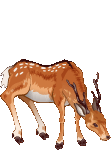 Tucked in and around the edges of the slopes are the true denizens of the natural surroundings: the deer, the foxes, the owls and hawks. This is their land, their home, and, except for the old man in the log cabin at the base of the mountain, they have not had to share it with humans. Will that change? If the mayor has his way, it will. But if his latest grand scheme doesn't pan out, the slopes and woods will go back to being what they have been for a million years: home to the deer, the foxes, the owls and hawks.
Tucked in and around the edges of the slopes are the true denizens of the natural surroundings: the deer, the foxes, the owls and hawks. This is their land, their home, and, except for the old man in the log cabin at the base of the mountain, they have not had to share it with humans. Will that change? If the mayor has his way, it will. But if his latest grand scheme doesn't pan out, the slopes and woods will go back to being what they have been for a million years: home to the deer, the foxes, the owls and hawks.
 It's dark now. The boys trudge home through deep snow, half-frozen and with red cheeks and runny noses, tired and yet filled with the kind of excitement that's only found in twelve-year-olds. "Man, when that German skier caught his ski and went flying -- I thought for sure he was a goner," says Billy. But Jimmy and Jeffrey have their own favorite disasters, and re-living them all is more fun than anyone deserves to have.
It's dark now. The boys trudge home through deep snow, half-frozen and with red cheeks and runny noses, tired and yet filled with the kind of excitement that's only found in twelve-year-olds. "Man, when that German skier caught his ski and went flying -- I thought for sure he was a goner," says Billy. But Jimmy and Jeffrey have their own favorite disasters, and re-living them all is more fun than anyone deserves to have.

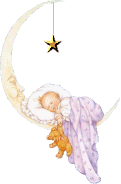 Hours later, the village is asleep. The owls are awake, but the deer in the woods have settled down for the night -- all except a very select few, who can be spotted taking off from the roof of a pretty blue house, where inside midwife Grace Newcomb and Doctor Nicholas Greene have together delivered a beautiful baby girl to once anxious, now ecstatic parents. Her name will be Noelle.
Hours later, the village is asleep. The owls are awake, but the deer in the woods have settled down for the night -- all except a very select few, who can be spotted taking off from the roof of a pretty blue house, where inside midwife Grace Newcomb and Doctor Nicholas Greene have together delivered a beautiful baby girl to once anxious, now ecstatic parents. Her name will be Noelle.
For earlier chapters of this Christmas tale, click on the links to previous mantels: